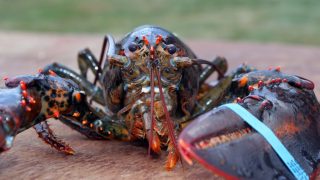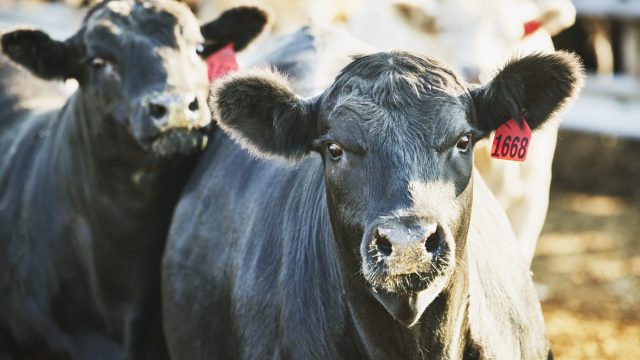
Switzerland Bans Practice of Boiling Lobsters Alive Without Stunning First
By Nicole Pallotta, PhD, Academic Outreach Manager
Citing research that suggests they feel pain, the Swiss government has passed a groundbreaking law banning the common practice of dropping lobsters and other crustaceans into boiling water without stunning the animals first. As of March 1, 2018, they will have to be stunned either by electric shock or mechanical destruction of the brain before being cooked alive. The new legislation also bans transporting or stocking live crustaceans on ice or ice water on the basis that the practice is inhumane, again citing evidence that these animals feel pain and can suffer, mandating instead that the animals should “always be held in their natural environment” (i.e. saltwater).
A spokesperson for the Swiss government told the Washington Post that the new law was driven by “the animal rights argument,” and that they initially put forth a motion to ban all lobster imports to the country, but the federal government “thought this measure was not applicable due to international trading laws.” So they decided to amend the existing law to improve “the animal protection aspect.”
The treatment of lobsters and other crustaceans is beginning to come under greater scrutiny due to mounting evidence that they likely feel pain and have the capacity to suffer. In June 2017, Italy’s highest court banned keeping lobsters on ice before killing them, ruling that it causes unjustifiable suffering, but stopped short of prohibiting the practice of boiling them alive. Echoing the status quo in the U.S. when it comes to farmed animals, the Italian court ruled the latter practice was legal because it is “common.”
And in February 2017, a Sydney, Australia, seafood store was convicted of animal cruelty for its inhumane treatment of lobsters. In both the U.S. and Australia, no matter how horrendously they are treated, it is rare for criminal cruelty charges to be brought in cases involving animals who are considered “food.” This is especially true when those animals are non-vertebrates, making this case particularly notable.
In the U.S. and elsewhere, the law typically provides scant protection to lobsters and other crustaceans. Whether they are covered under state animal cruelty laws often depends on how the specific legislation defines the term “animal,” as well as any exemptions or other limiting language as to animals raised and used for food (including “common” or “accepted” industry practices). Even if crustaceans are not expressly excluded from the applicable statute, it is highly unlikely a prosecutor would pursue cruelty charges involving a lobster or crab due to societal norms.
A 2013 People for the Ethical Treatment of Animals (PETA) undercover investigation into cruelty at a Maine lobster plant is illustrative. Video revealed lobsters and crabs being ripped apart while alive and fully conscious, and the organization filed a complaint requesting the owner of the facility be investigated for possible violations of the state’s criminal animal cruelty statute. Although Maine’s animal cruelty statute covers “every living, sentient creature” besides human beings, the district attorney declined to pursue charges, asserting “it is far from clear that the Legislature intended to include lobsters and crabs within this definition…the opposite intention is more likely.”
Switzerland’s new legislation reflects a growing awareness of the cognitive and neurological capacities of aquatic animals. Although these animals have in the past proven difficult to study due to their different anatomies – lobsters and other crustaceans lack the brain structure typically associated with pain sensation – scientists are starting to realize comparing their brains to ours has inherent limitations that can obscure our understanding of the animals’ ability to suffer.
According to NBC News, reporting on studies conducted by biologist Robert Elwood, whose research was used as a basis for Switzerland’s new law:
In the past, some scientists reasoned that since pain and stress are associated with the neocortex in humans, all creatures must have this brain structure in order to experience such feelings. More recent studies, however, suggest that crustacean brains and nervous systems are configured differently. For example, fish, lobsters and octopi all have vision, Elwood said, despite lacking a visual cortex, which allows humans to see.
A 2009 paper on which Elwood was lead author, “Pain and stress in crustaceans?” considered evidence that crustaceans might feel pain and stress in a manner similar to vertebrates, concluding that:
…there is considerable similarity of function, although different systems are used, and thus there might be a similar experience in terms of suffering. The treatment of these animals in the food industry and elsewhere might thus pose welfare problems.
Some of the arguments made in the paper were summarized by NBC News:
For one thing…crustaceans possess ‘a suitable central nervous system and receptors.’ They learn to avoid a negative stimulus after a potentially painful experience. They also engage in protective reactions, such as limping and rubbing, after being hurt. Physiological changes, including release of adrenal-like hormones, also occur when pain or stress is suspected. And the animals make future decisions based on past likely painful events. If crabs are given medicine — anesthetics or analgesics — they appear to feel relieved, showing fewer responses to negative stimuli. And finally, the researchers wrote, crustaceans possess ‘high cognitive ability and sentience.”
A more recent study, conducted by Elwood and co-author Barry Magee -showed that a close relative of the crab species commonly used for food responds to electric shocks and then goes on to avoid them. The study found that: “These data, and those of other recent experiments, are consistent with key criteria for pain experience and are broadly similar to those from vertebrate studies.”
As reported by the BBC, the scientists concluded: “the findings suggest the food and aquaculture industry should rethink how it treats these animals.”
Biological anthropologist Barbara King, author of “Personalities on the Plate: The Lives and Minds of Animals We Eat,” summed up the concerns of many scientists and animal advocates when she told the Washington Post there is a long history of underestimating animal pain. Although she is convinced lobsters can feel pain, she added:
“Whether we know or don’t know, it’s our ethical responsibility to give them the benefit of the doubt and not put them into boiling water.” King said there are debates about whether people should eat lobsters at all, “so in my view, it’s a pretty low bar to make sure that if we do eat them, we don’t torture them first.”
Indeed, the Swiss government seemed intent to give crustaceans the benefit of the doubt, issuing the following statement: “it must be assumed that these animals are sentient and therefore must not be allowed to suffer unnecessarily” [emphasis added].
Science can be an important tool to preventing animal cruelty by providing evidence for animals’ ability to feel pain and pleasure, which will hopefully be used to inform and improve our laws. Switzerland has set an example by reforming its animal protection laws to conform to current scientific findings about animals’ capacities to feel pain and suffer.
Further Reading:
- Weintraub, Karen. “The Swiss Consider the Lobster. It Feels Pain, They Decide.” New York Times. January 12, 2018.
- Agence France-Presse. “Switzerland rules lobsters must be stunned before boiling.” The Guardian. January 10, 2018.
- Morelle, Rebecca. “Further evidence crabs and other crustaceans feel pain.” BBC World Service. January 17, 2013.
- Viegas, Jennifer. “Lobsters and crabs feel pain, new study shows.” NBC News. March 27, 2009.
- Levenda, Kelly (2013). “Legislation to Protect the Welfare of Fish.” Animal Law. Vol. 20. P. 119.
- Aquatic Animal Law Initiative, a project of the Animal Law Clinic at Lewis & Clark Law School and the Center for Animal Law Studies, in collaboration with the Animal Legal Defense Fund.
Focus Area
How We Work
Related
-
CDC Seeks to End Program Using Monkeys in Research
The Animal Legal Defense Fund continues to advocate for animals suffering in research labsDecember 8, 2025 News -
Tyson Foods Agrees to Stop Making ‘Net-zero’ and ‘Climate-smart Beef’ Claims
Lawsuit alleged Tyson Foods falsely claimed it will be net-zero by 2050 and marketed its industrial beef products as “climate-smart”November 17, 2025 Press Release -
City of Sturgeon Agrees to Pay $500,000 in Settlement Over Police Shooting of Blind, Deaf Dog
The lawsuit argued the lethal force used violated the 4th amendmentNovember 14, 2025 Press Release



